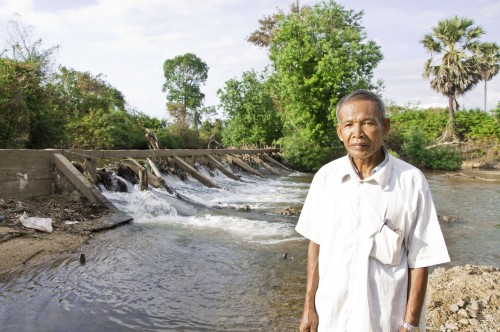IRDEP-TH – Farming activities have increased significantly since the new spillway started functioning in early 2011. Meanwhile, the number of villagers who out-migrated to find jobs elsewhere has decreased dramatically, according to Mr. Lounh Nouv, Chief of Chrak Khlong village, Monourom commune in Thpong district of Kampong Speu province.
 |
 |
 |
Under LWD’s Community-based Disaster Risk Management Project, the spillway was built in late 2010 across a stream in order to catch water and then divert it through a canal for irrigating the farmers’ rice fields. The project cost $3,200, of which $3,000 was funded by LWD, $125 was contributed by the community and $75 by the commune chief. The project can irrigate 270 hectares of rice fields in Chrak Khlong including five more neighboring villages.
For Chrak Khlong, Mr. Nouv said, there were only 30 out of a total of 95 farmer families growing peanuts in 2010 and their cultivation was dependent on the rain water. After having seen the high potential of the new spillway, in 2011, the number of the grower families increased by 75. Now, the farmers of Chrak Khlong and their neighboring villagers gained extra profits from their fields in the dry season, he said.
Ms. Noeun Channy, 33, from Chrak Khlong
village, said that just having seen the potential of the spillway, she decided to ask a well-off person whose farmland (sized 20m x 30m) was left idle every dry season in her village to grow peanuts. With the permission, she immediately started her farm work.
For her first harvest in April, she collected 300 kg of peeled peanuts. She sold 200kg of the total and kept the rest for growing in the dry season next year. She earned 1,300,000 riels ($325), she said.
After harvesting peanuts, she grew some vege-tables for her family consumption. “Now, I have enough water for gro-wing vegetables in the dry season,” she said, adding that over the past years, she bought vegetables in the village every day. She spent $0.50 and got only a single kind of vegetable. “But, now I have my own vegetables and I have se-veral kinds of them,” she added.
She said since she started her farm work, her husband, Phoeung Chel, stopped out-migrating to find jobs. He helped her tend the farm. “My fa-mily living condition has improved a bit more. My children have some poc-ket money when they go to school every day,” she said.
Ms. Channy has three daughters and a son. Her oldest daughter is 13 and the youngest one is 4. Her family is one of the poorest families in the village. She became a partner of LWD since 2007.
Ms. Maerk Ouk, ano-ther partner of LWD from the same village, also made her first try to grow peanuts, string beans, morning glory and lettuce.Within three months, her peanuts yielded the same quantity as Ms. Channy. She also gained an extra income of $100 from the sale of her string beans. She planned to increase the cultivation next dry season.
“The spillway provided a great benefit for all of us,” she said.
